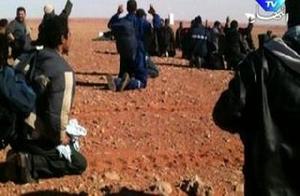TerrorismAlgerian hostage drama over; 48 hostages, 32 terrorists dead
Algerian forces have taken control of the gas drilling site near the Algeria-Libya border, and the authorities are trying to determine the human toll of the 4-day drama. Initial estimates indicate that forty-eight hostages and thirty-two terrorists have died in the fire exchanges between the hostage takers and the Algerian military. The Algerian government says that five of the Islamist terrorists were captured alive. The forty Islamist hostage-takers came from six different countries, and trained for the operation in a base in Islamist-controlled north Mali.

Hostages surrender to militants in Algerian video capture // Source: aalmiakhbar.com
Algerian forces have taken control of the gas drilling site near the Algeria-Libya border, and the authorities are trying to determine the human toll of the 4-day drama.
The BBC reports that initial estimates indicate that forty-eight hostages and thirty-two terrorists have died in the fire exchanges between the hostage takers and the Algerian military. The Algerian government says that five of the Islamist terrorists were captured alive.
The task of determining the number of hostages and terrorists killed is made more difficult because some of the bodies found on the site were burnt beyond recognition.
In the initial phase of the campaign to take over the site, which begun Wednesday night, the Algerian used helicopter gunship and tanks. The final assault, on Saturday, was carried by commando unites on the ground.
As the Algerian military gained access to the bodies of the dead terrorists, and as interrogation off the five Islamists captured alive proceeded, it became clear that the jihadist group which attacked the site and took the hostages was a multinational force. The Algerian government says that the attackers came from at least six different countries.
Algerian intelligence sources say that the group of about forty terrorists trained for the operation in a base located in north Mali, a breakaway region controlled by al Qaeda-affiliated Islamists since last April.
The New York Times reports that an Algerian jihadist, Mokhtar Belmokhtar, who is based in Mali and has ties to al Qaeda, has claimed responsibility through spokesmen for masterminding the raid.
The BBC reports that a Mauritanian Web site, Sahara Media, reported that Belmokhtar had claimed responsibility for the attack in a video message.
The militants announced that the attack on the gas drilling site came as a retaliation against Algeria after it had allowed France to use Algeria’s airspace for attacks against Islamist forces in north Mali who were moving south toward the Mali capital of Bamako.
Observers noted a contradiction in the Islamists’ statement: the statement said that operation against the drilling site has been in preparation “for months,” but the French begun their attack on the Islamists in north Mali on Friday, 11 January.
Although there were some questions raised in Western capitals about whether the Algerian military was heavy handed in its application of fire power, especially during the first two days of the battle, there were many public expressions of support for the Algerian action, and an indication that Europe and the United States now view the campaign to rid north and west Africa of Islamist militants as a central battle in the war on Islamic terrorism.
“We have had successes in recent years in reducing the threat from some parts of the world, but the threat has grown, particularly in North Africa,” Prime Minister David Cameron of Britain said in a televised address.
“This is a global threat, and it will require a global response,” he said. “It will require a response that is about years, even decades, rather than months. It requires a response that is patient and painstaking, that is tough but also intelligent, but above all has an absolutely iron resolve, and that is what we will deliver over these coming years.”
He added: “What we face is an extremist, Islamist, al Qaeda-linked terrorist group. Just as we had to deal with that in Pakistan and in Afghanistan, so the world needs to come together to deal with this threat in North Africa.”
